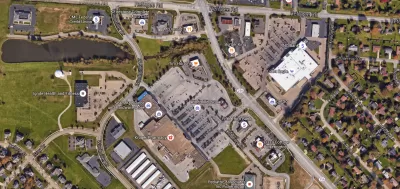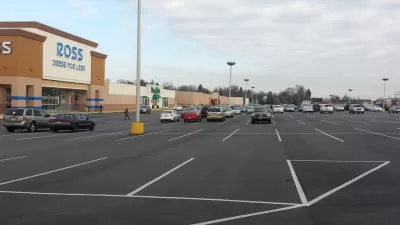Based on crowdsourced data from across the country, this updated map shows which municipalities have eliminated, lowered, or discussed their parking minimum laws.

The folks over at Strong Towns have been vociferous in their opposition to parking minimum laws. Rachel Quendau writes, "The proliferation of parking minimums over the last several decades has resulted in the demolition of beautiful historic buildings and the ruin of productive commercial districts—giving us communities filled with empty asphalt instead of homes and businesses."
Last year, the team wanted to dig deeper. "What if we tried to track parking minimum laws in every city in the nation? We knew they were prevalent and problematic almost everywhere, but we wanted to get an idea of the scale and learn the details of each municipal code." The result: a crowdsourced map of the country showing where parking minimums have been eliminated, lowered, or are under discussion.
In some denser locales, however, cities are subbing in parking garages for lots. Quendau quotes a Pittsburgh contributor to the project: "While the submitter may be correct that parking minimums have been eliminated downtown [...] the city and our urban development organization have actively, quite actively in fact, worked to subsidize tons of structured parking in the downtown zone."
FULL STORY: Our Parking Minimums Map - Updated

Planetizen Federal Action Tracker
A weekly monitor of how Trump’s orders and actions are impacting planners and planning in America.

Restaurant Patios Were a Pandemic Win — Why Were They so Hard to Keep?
Social distancing requirements and changes in travel patterns prompted cities to pilot new uses for street and sidewalk space. Then it got complicated.

Map: Where Senate Republicans Want to Sell Your Public Lands
For public land advocates, the Senate Republicans’ proposal to sell millions of acres of public land in the West is “the biggest fight of their careers.”

Maui's Vacation Rental Debate Turns Ugly
Verbal attacks, misinformation campaigns and fistfights plague a high-stakes debate to convert thousands of vacation rentals into long-term housing.

San Francisco Suspends Traffic Calming Amidst Record Deaths
Citing “a challenging fiscal landscape,” the city will cease the program on the heels of 42 traffic deaths, including 24 pedestrians.

California Homeless Arrests, Citations Spike After Ruling
An investigation reveals that anti-homeless actions increased up to 500% after Grants Pass v. Johnson — even in cities claiming no policy change.
Urban Design for Planners 1: Software Tools
This six-course series explores essential urban design concepts using open source software and equips planners with the tools they need to participate fully in the urban design process.
Planning for Universal Design
Learn the tools for implementing Universal Design in planning regulations.
Heyer Gruel & Associates PA
JM Goldson LLC
Custer County Colorado
City of Camden Redevelopment Agency
City of Astoria
Transportation Research & Education Center (TREC) at Portland State University
Camden Redevelopment Agency
City of Claremont
Municipality of Princeton (NJ)





























